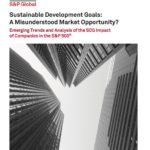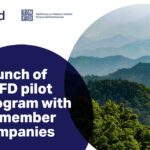There is a real, positive pay-off from corporate triple bottom line programmes, according to SustainAbility’s new report for the United Nations. The report, Buried Treasure: Uncovering the business case for corporate sustainability, is based on international research and finds that a strategic focus on sustainable development is both significantly and positively aligned with mainstream business success.
Backed by the Industry Division of the United Nations Environment Programme and over 20 companies, the project has produced two key outputs. The printed report is being released simultaneously with the launch of an open-access interactive web-site, Buried Treasure Online, which will track the issues over time.
The prospect of win-win opportunities doing well by doing good has long tantalised the business and sustainable development (SD) communities. With signals of a global economic downturn getting stronger, the need for a strong business case is increasingly urgent, as fewer companies will be willing or able to embrace SD on faith alone.
Over the past few years, a growing body of evidence has emerged to support the business case for improving corporate SD performance. Buried Treasure synthesises and interprets this evidence in a powerful and user-friendly format. The Sustainable Business Value Model maps the links between 10 dimensions of sustainable development (SD) performance with 10 conventional measures of business success, including financial performance measures and underlying drivers of business value. The report also provides real life examples as supporting evidence.
Buried Treasure demonstrates that not only is there a relationship between SD performance and enhanced corporate reputation and brand value, there are also significant links to other business success dimensions like shareholder value, operational efficiency, human and intellectual capital, and risk profile. While established SD dimensions like superior environmental performance currently benefit from the strongest business case, other SD dimensions particularly good workplace conditions and strong ethics, values and principles also correlate with increased business value.
The report also outlines emerging trends that will strengthen the links between SD performance and business success in the coming years, and offers a short set of guidelines to companies to help them better understand the business case for sustainable development in their own organisations.
"This is not just about values, it’s about value creation," says John Elkington, Chairman of SustainAbility. "Growing numbers of companies are spotlighting the business case in their corporate environmental or sustainability reports, but they’re not yet punching this through to financial analysts. One reason: it takes time to get the message across – and time analysts haven’t got. The Sustainable Business Value Matrix distills a huge amount of information down into a digestible format." Elkington, who sits on advisory boards for a number of financial institutions, notes that there is growing financial market interest in the business case. "The Matrix is version 1.0," he says, "but now as the framework exists expect to see rapid growth in useful, board-friendly knowledge."
Jacqueline Aloisi de Larderel, Director of UNEP’s Division of Technology, Industry and Economics (one of the projects main sponsors) says, "UNEP has been spreading the message that good environmental management and more broadly sustainable management makes good business sense. However, the need to prove internally and externally that investing in better SD performance leads to a healthy financial bottom line is still a challenge that needs to be addressed more widely and more strongly."



